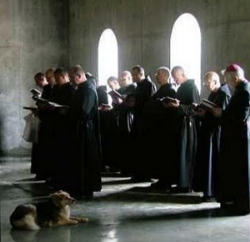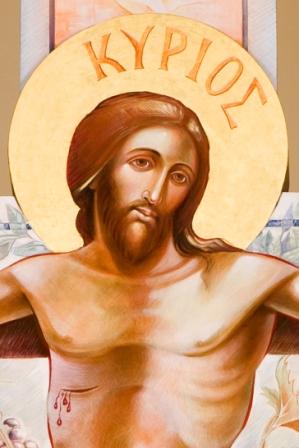Over the course of these days, the Christian world is in the midst of celebrating what the Catholic Church calls the Easter Triduum, that three-day period of Maundy Thursday, Good Friday, and Holy Saturday. During a triduum, the Church celebrates with more intensive prayer and devotion the occasion leading up to the occasion immediately following it, so it is typical for a triduum to precede some important feast. Certainly for the Easter Triduum, the feast transpiring is the greatest feast in the liturgical year, that of the Resurrection of our Lord Jesus at Easter.
For Christians truly to reap the spiritual fruit of Easter, we must be willing to enter as fully and as deeply as possible into the Paschal Mystery — that is, the passion, death, and resurrection — of our Lord Jesus. This feat is no easy one, for as our hearts and minds are willing to enter more deeply into the Will of God in this holy season, we are drawn more intimately into the intense love of our Lord in His perfect gift of self in the Holy Eucharist at the Lord’s Supper of Maundy Thursday, and soon thereafter into His lonely agony of the Garden of Gethsemane.
We stand next to Jesus as Judas Iscariot betrays our Lord with the worst “kiss of death” known in the history of mankind and experience the abandonment of the Lord by his best friends at the time of His greatest need. God confronts us in this moment not to abandon Christ again, but rather to sit in humble adoration of Him as Lord, even through witnessing His mocking and scourging, the farce of His trial, and along the Via Crucis (Way of the Cross) up until His death at Calvary on the Cross of Good Friday. We long to rest with Him in patient waiting within the tomb of his Holy Sepulchre, watching in expectant, prayerful hope for Jesus to arise in new life in the splendor of Easter.
It is the most beautiful time of Church’s liturgical year, and also the most difficult if it is taken with the seriousness that it merits. In entering into the Paschal Mystery, the Christian dares to encounter the living Lord Jesus in the fullness of what He has endured for the sake of our personal salvation. It is important to note here the terms personal and encounter within the spectrum of human time and God’s eternity. As Son of Man, Jesus lived the historical events of the Easter Triduum into Easter Sunday at a specific point in human history approximately 2,000 years ago.
However, as Son of God, Jesus is not bound by time. Rather, as Eternal Son of the Father, these events are not bound by time. At any given human moment in our personal encounter with Jesus, we face our Lord in our own personal lives as He bows down in loving service to wash our feet and as we sup with Him, as we betray Him by our sinful actions, as we abandon Him in fear of what the world threatens to do to us if we remain faithful to the Lord. We personally sit in cowering fear of those who mock Jesus and deny that we know Him when He desires our friendship the most, lest the world subject us to the same trials, and we experience the deep shame with Saint Peter for having caved in to the world’s sinful ways once again.
We strive to walk alongside Jesus to be His Simon of Cyrene, at first protesting because it is too humilating and no human being ought to be subjected to such torture and ridicule … It is so offensive to our inherent sense what human dignity deserves. But as we walk alongside Jesus and personally encounter him face to face at every Station of the Cross, by the time we reach Calvary with Him, we are transformed, changed inside and out by the reason why Jesus chose to go through such bitter humiliation, suffering, and even brutal death: He did all of this in perfect love, for me, so that I could live forever with Him and not have to pay forever myself that terrible price due to my own sin.
What is my response? Do I remain spiritually asleep, conveniently refusing to be disturbed as it is simply too uncomfortable to be challenged with the notion that I am called to be transformed into Jesus’ perfect image and likeness? Do I dare admit that there are times when I have been wrong and set Jesus on this course to the Cross by my own personal actions of refusing to love as He does? Jesus’ perfect self-gift on the Cross indeed should be jarring to us … It should lead us to encounter the One Who has been pierced on the Cross, the One whose total being in Love with us as God’s Love in human flesh for us shows us so starkly just how much further we have to grow in order to be completely loving as He is.
Yet Jesus nonetheless ever patiently and lovingly looks into our eyes and speaks to our heart, Come, abide with me, wherever I go. If we are awake enough truly to listen to this His invitation, we grow in our desire to respond to Him in expressions of authentic love, allowing His Love to pierce our hardened hearts so that His Sacred Heart — pierced by our sins — may pour forth His Lifegiving Holy Spirit and enflesh our hearts with His Love (Ez. 36.26-27). For our hearts to become like His, we must allow Jesus to transform us … We cannot do so merely out of our own resources. The Easter Triduum is a pointed reminder that we just don’t have what it takes on our own to live the life of holiness to which Jesus calls us. Rather, we must be open to the Holy Spirit, Who will transfigure us with God’s infinite Love if we only we would invite Him into our life. The more deeply we invite Him in, the more we permit God to transform us into an image and likeness of Jesus that becomes increasingly recognizable as His Own.
It is in this spirit that the monk seeks for his life to be a perpetual Lent but also a continuous Easter. We hear from Saint Benedict in his Prologue of the Rule of Saint Benedict (RB): Never swerving from His instructions, then, but faithfully observing His teaching in the monastery until death, we shall through patience share in the sufferings of Christ that we may deserve also to share in His Kingdom (v.50). Patience comes from the Latin verb patior, pati meaning “to suffer”, and given that Saint Paul teaches us that “Love is patient” (1 Cor. 13.4), our patience indicates our strong love for Christ Jesus and our open willingness to walk in His Way alongside Him, wherever our Good Shepherd leads us.
While this attitude is one to embrace in daily life, it is not easy even for a monk to live out, due to our human weakness (RB 49.1-2): The life of a monk ought to be a continuous Lent. Since few, however, have the strength for this, we urge the entire community during these days of Lent to keep its manner of life most pure and to wash away in this holy season the negligences of other times. This we can do in a fitting manner by refusing to indulge evil habits and by devoting ourselves to prayer with tears, to reading, to compunction of heart and self-denial … Let each one deny himself … and look forward to holy Easter with joy and spiritual longing (RB 49.1-4, 7).
This compunction of heart (compuctio cordis) literally means allowing our “heart to be punctured with” the Heart of Christ, such that by permitting our heart to be pierced with the Love of Jesus while our sin pierces His Sacred Heart on this Good Friday, we may look forward ever more eagerly to Easter with expectant hope. “It is high time for us to arise from sleep” (RB Prol. 8, Rom. 13.11), to “run on the path of God’s commandments, our hearts overflowing with the inexpressible delight of love” (RB, Prol. 49) so that we might share forever in His Kingdom.
This Way of God’s Love is a narrow one, for “Narrow is the road that leads to life” (Prol. 48, 5.11, Mt. 7.14). As we place our hope in God alone (RB 4.41), we will come to yearn for everlasting life with holy desire, day by day reminding ourselves that we are going to die, hour by hour keeping careful watch over all we do, aware that God’s gaze is upon us whenever we may be (cf. 4.44-47), and we will have to render an account one day for all that we have done. In other words, live every day as if it is your last … and one day you will be right! Perhaps this truth is even better articulated by the skeletons of the Capuchin cemetery of Santa Maria della Concezione in Rome: What you are, we once were … What we are, you will become.
In keeping Jesus’ suffering, death, and entombment of this Easter Triduum always before our eyes, we are reminded of the superior price that Love called our Lord to pay so that we might have the fullness of life forever in Him. In remembering that we too shall die at an unknown hour, as Christians we choose to live in the now knowing that we will have to answer for our actions – right and wrong – on that day of our death when we will appear before the throne of the Most High God. At that time of God’s judgment particular to us, each human being will encounter Jesus Christ crucified and will hear Jesus’ piercing question: Who do you say that I am? May we be able to respond to Him on that day in the fullness of love: You are my Christ, my Lord, my Savior. As Christians, may we live every moment now in preparation for that day when all of our heart and mind, body and soul, every ounce of our being is called to experience the powerful splendor of Jesus’ Easter Resurrection in eternal life.


